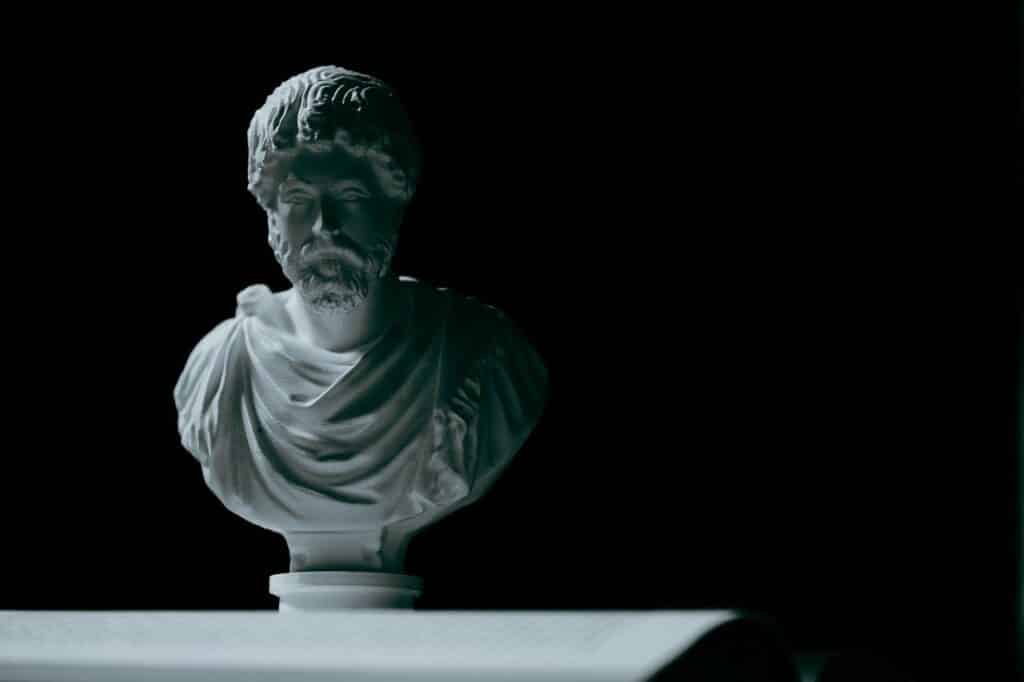What’s life about? Why are you here? What’s the purpose of it all? I don’t know how often you think about these sorts of questions, but I’ve been down this rabbit hole a lot in the past 30-odd years. And I’ve come to one simple conclusion: who cares, let’s be happy.
Okay, it might sound a bit simplistic and maybe it is. But my point is this: you’re alive right now, you won’t be some day, and all we really have is this moment. If that’s the basis of reality, then why are we so worried about cellulite, what size jeans we wear, the zeroes in our bank account, or wearing that ridiculous hat you love so much? What if we could find more happiness in our lives by leaning into the lessons of ancient ideas?
And this is what I’m on about. I’m fascinated by philosophies, religions, and modalities that support people in living richer and more contented lives. And stoicism is one of those ideas. Can it really support us in modernity? Can it help us live happier?

What is stoicism?
It’s pretty common-place to refer to someone who’s seemingly incapable of emotions as stoic. This ‘stoic’ might come across as unfeeling, like a zombie, and maybe that’s how you see stoicism. But it’s a weird modern take on this much richer ancient philosophy.
Stoicism is a philosophical school of thought that originated in Greece around the 3rd-century BC. It emphasises the idea that most things are outside of your control, and so should be allowed and accepted regardless of how challenging. Your thoughts, virtues, and actions—the things that we can control—are what we should put most emphasis on. It’s about maintaining a steady and relaxed mind, finding resilience and wisdom, even through life’s challenges.
Of all the stoics, the most famous include Seneca, Marcus Aurelius, and Epictetus. Let’s dive into their lessons and how we bring them into our modern lives.
Seneca’s Wisdom: Embrace Challenges
Seneca offers us pearls of wisdom in his “Letters from a Stoic”. Maybe you’re a woman juggling work deadlines, family responsibilities, and a thousand other things. Life is challenging, tiring, and you’re struggling against constant stress, anxiety, and overwhelm. Seneca would remind you that while you can’t control external events, you’ve got absolute power over your reactions. Embrace challenges with grace, and suddenly, life’s storms become a lot more manageable.
In action
It’s easy to write this out, easier to speak it aloud, but how the hell do we ’embrace challenges with grace’? It’s a constant work in progress, something we need to work on often, but these are the lessons of meditation and mindfulness. If you can build a habit of mental mastery—meditation is one of the best ways to do this (try my 30-Day Meditation Challenge to really get your habit built-in)—then you’ll have lessons of acceptance, openness, focus, and clarity to lean on whenever life gets hard. Practice, my friend, and you’ll see changes happen.
Marcus Aurelius’ Journaling Hack: Daily Mindfulness
Marcus Aurelius is famous today, you’ve probably heard of him, but he was born in 121 AD. Nearly two-thousand years later and we’re still able to be inspired by his Stoic writing. His most famous work is his journal Meditations, which serves as a guide to practicing mindfulness in the chaos of life. He was famous as saying, “Very little is needed to make a happy life; it is all within yourself, in your way of thinking”.
In action
So how can we use Marcus’ insights to lead better lives today? It’s an easy one: journal. Your writing doesn’t have to stand the test of time, it doesn’t even have to make much sense. But start a practice of writing every morning and evening and learn to reflect on your daily experiences. In particular, notice your reactions, the way you felt when challenges happened. By becoming aware of the way you react to life, you can learn to become more aware of these reactions, instead of letting them blindly happen. More awareness will help you take more control over your emotions, helping you find your centre.
Epictetus’ Art of Letting Go: Unshackling from Stress
Epictetus, born into slavery, teaches us the power of perspective. In his Enchiridion, a short Stoic manual for life, he emphasises that it’s not actually external events but our interpretations of them that cause us stress. By reframing challenges and letting go of unnecessary worries, we can reclaim control over happiness.
In action
Again, “just let go of worries” is beyond simple to type out. Try giving this advice to a friend going through a hard time and you’ll probably get an eye-roll and you’ll not speak to them again for a while. So let me remind you: all of this is a practice. You don’t expect to run a marathon on your first day lacing up your trainers, do you? Practicing Stoic philosophy (or mindfulness, mental mastery, or whatever you want to call it) is the same.
The next time you’re finding yourself in a situation of reacting (having incontrollable emotional and physical responses to a situation, probably in a dramatic way) instead of responding (a calmer, more controlled way of dealing with something challenging) try breathing deeply and counting to ten (this breath practice will be a saviour). This will give you space and time away from your immediate reactions, enough to allow your brain to think rationally and in a way Epictetus would be proud of.
The takeaway
Life is chaos, my friend, it’s a simple reality; we can’t control what will happen to us from one moment to the next, not really. But Stoicism can support us in learning to control the way we respond to all of it. Stoicism is a simple, mindful philosophy that can absolutely guide us toward living a more connected and joyful life. Try meditation, journalling, and mindful breathing to support you in this process, and you’ll realise the ancient Greeks, modern-day yogis, and so many other disciplines have the same result in mind: living a better life.
